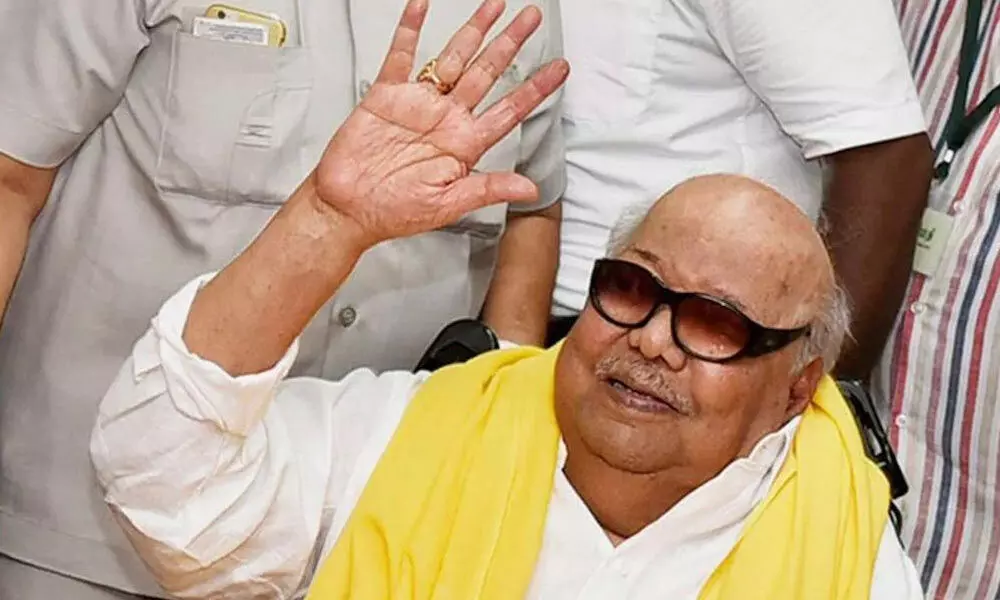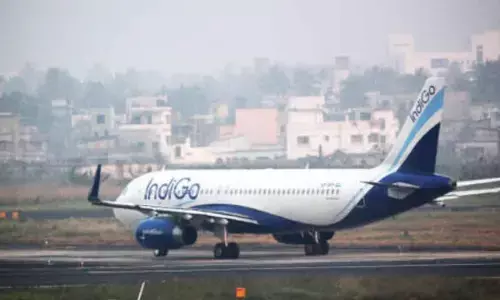Karunanidhi-The undisputed tallest leader of Tamil Nadu

Karunanidhi
Karunanidhi enjoyed an extraordinary status in Indian politics Muthuvel Karunanidhi whose original name was Dakshinamurty had a six-decade-long career in Tamil politics
Karunanidhi enjoyed an extraordinary status in Indian politics Muthuvel Karunanidhi whose original name was Dakshinamurty had a six-decade-long career in Tamil politics. He has been the leader of the Dravida Munnetra Kazhagam since 1969 and the Chief Minister of Tamil Nadu five times. He has been the undis-puted tallest leader in the state.
Karunanidhi's contributions to state and national life are many. He is known for pioneering several social justice and welfare schemes, as also for championing the causes of Dravidian iden-tity and Tamil language.
Born in a poor working-class family in Tiruvarur town in 1924, he entered public life at the age of 14 when he dropped out of school to join the student wing of the Justice Party, which later became a movement to bolster Tamil identity. The justice party had challenged elitism, religious dogma and caste orthodoxies. Karunanidhi was attracted towards these ideals particularly its emphasis on Tamil identity.
Apart from campaigning against the caste supremacy of Brah-mins he opposed a move by the federal government to impose Hindi as an official language of communication in south India
The advantage Karunanidhi had was that he was well known writer and poet. As a screenwriter in the Tamil film industry, he honed skills for promoting the Dravidian movement.
He became a close associate of DMK founder C N Anna-durai and first received broader notice in Tamil politics when he led a 1953 protest in a town where its Tamil name had been re-placed with one honouring an industrialist from northern India with a Hindi name. He formed organizations for the local youth and students and started a newspaper that eventually became the Murasoli, the DMK's official newspaper.
Karunanidhi was known as a wordsmith beyond compare. His wit and clever puns gave him a Wilde-like literary charm which was unmatched in Tamil politics.
His fans were swayed by his gravelly voice, hyperbolic flourishes and blazing oratory. His theatrical moments of repetition for em-phasis with a liberal sugar dust of irony and humour were hugely popular. And his unique gift of employing Tamil grandiose literary verse one moment and using a mocking street cadence in the next showed his mastery in appealing to all kinds of listeners.
Karunanidhi enjoyed an extraordinary status in Indian politics His party also joined the coalition government headed by the Bhara-tiya Janata Party's (BJP) AB Vajpayee in 1999. The DMK contin-ued to play a key role in federal politics as it joined the Con-gress-led coalition in 2004 after it defeated the BJP.
In the theatrical world of Tamil Nadu politics though, he faced corruption charges and was subject to a midnight arrest by his fierce rival Jayalalitha who died in 2016, he regularly dealt with accusations of nepotism.
Supporter of language
Even after the DMK split away from the Dravida Kazhagam in 1949, the former espoused a strong stand against Hindi imposi-tion. The agitation the party staged in July 1953 against chang-ing the name of Kallakudi to Dalmiapuram was etched in the an-nals of history. At the helm of the protest was Karunanidhi, who erased 'Dalmiapuram' from the name board of the town's railway station.
As an administrator, he was known for taking quick decisions "The doctors sought increase in salaries and were planning to go on strike the next day. It was at 7.30 pm, I got a call asking about whether the file pertaining to rise in doctors' salaries had been cleared. I told him that it was with the minister. Immediately, he summoned the minister who was travelling by train near Chengalpattu to his home with the file," a former bureaucrat re-called.
One of his foremost legacies is Periyar Memorial Equality Vil-lage. It envisaged a housing complex where all communities could live without any discrimination and have equal access to civic facilities.
It was inaugurated by Karunanidhi on August 17, 1998 in the Melakottai village near Tirumangalam, Madurai. Each house was built at a cost of Rs 35,000 each. The title deeds for the plots were in the names of women, ensuring empowerment for them.
Another landmark scheme started by Karunanidhi is the compre-hensive health insurance scheme for the poor aimed at providing health insurance to low income groups, allowing them to access high quality surgical and diagnostic care in empanelled hospitals. He died on August 7, 2018.










